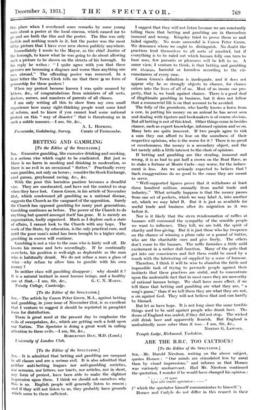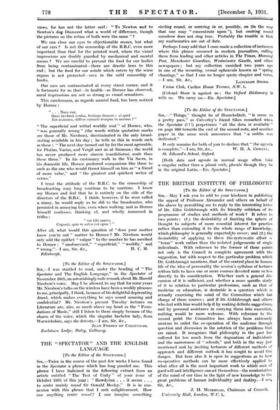ARE THE B.B.C. TOO CAUTIOUS?
[To the Editor of the SPECTATOR.] SIR,—Mr. Harold Nicolson, writing on the above subject, quotes Horace : " Our minds are stimulated less by aural than by visual impressions," and informs us that Horace was curiously unobservant. Had Mr. Nicolson continued the quotation, I wonder if he would have changed his 'opinion : et quae Ipso sibi tradit spectator : —" (" which the spectator himself communicates to himself.") Horace and Carlyle do not differ in this respect in their views, for has not the latter said : " To Newton and to Newton's dog Diamond what a world of difference, though the pictures on the retina of both were the same " ?
We can close our eyes to objectionable scenes, but what of our ears ? Is not the censorship of the B.B.C. even more important than that for the printed word, where the visual impressions are doubly guarded by mechanical and mental means ? We are careful to prevent the food for our bodies from being contaminated—there are drastic laws to this end ; but the food for our minds which enters by the sense organs is not protected—save in the mild censorship of books.
Our ears are contaminated at every street corner, and it is fortunate for us that—in health—as Horace has observed, aural impressions are not so strong as visual sensations.
This carelessness, as regards mental food, has been noticed by Horace : " . . . Nam cur, Quae laedunt oculos, festinas domore ; si quid Est animum, differs curandi tempus in annum ?"
" The superficial and withal worldly soul " of Horace, who, " was generally wrong " (the words within quotation marks are those of Mr. Nicolson), discriminated in the only broad- casting available in his day ; he tells us this in words such as these : " The next day turned out by far the most agreeable, for Plotius, Varius, and Vergil met us at Sinuessa ; the world has never produced more sincere (candidiores) souls than these three." In his customary walk in the Via Sacra, in his domestic life, Horace preferred companions like these to such as the one who would thrust himself on him as " a friend of more value," and " the greatest and quickest writer of verses."
I trust the attitude of the B.B.C. to the censorship of broadcasting may long continue to be cautious. I know my Horace and feel that he is entirely on the side of the directors of the B.B.C. I think, however, if he were called a ninny, he would reply as he did to the broadcaster, who persisted in annoying him, even when walking, and as Horace himself confesses, thinking of, and wholly immersed in trifles :
" est tibi mater,
Cognati, quis to salvo est opus ? "
After all, what would this question of "does your mother know you're out " matter to Horace ? Mr. Nicolson would only add the epithet " vulgar " to the number he has ascribed to Horace : " unobservant," " superficial," " worldly," and











































 Previous page
Previous page